pipenv is not recognized as an internal or external command
Last updated: Apr 4, 2024
Reading time·4 min

# pipenv is not recognized as an internal or external command
The error "'pipenv' is not recognized as an internal or external command,
operable program or batch file" occurs when we forget to install pipenv before
running the command.
To solve the error, install the pipenv package by running the
pip install pipenv command.

Make sure you have pipenv
installed by running the following command in cmd.
pip install pipenv # 👇️ for Python 3 pip3 install pipenv # 👇️ If you don't have pip in your PATH environment variable python -m pip install pipenv # 👇️ using py alias py -m pip install pipenv # 👇️ for Python 3 python3 -m pip install pipenv # 👇️ If you get a permissions error pip install pipenv --user
You should now be able to use the pipenv command as follows.
pipenv --help pipenv --version python -m pipenv --help python -m pipenv --version py -m pipenv --help py -m pipenv --version
If the installation command doesn't succeed, try running CMD as an administrator.
To open CMD as an administrator:
Click on the Search bar and type CMD.
Right-click on the Command Prompt application and click "Run as administrator".
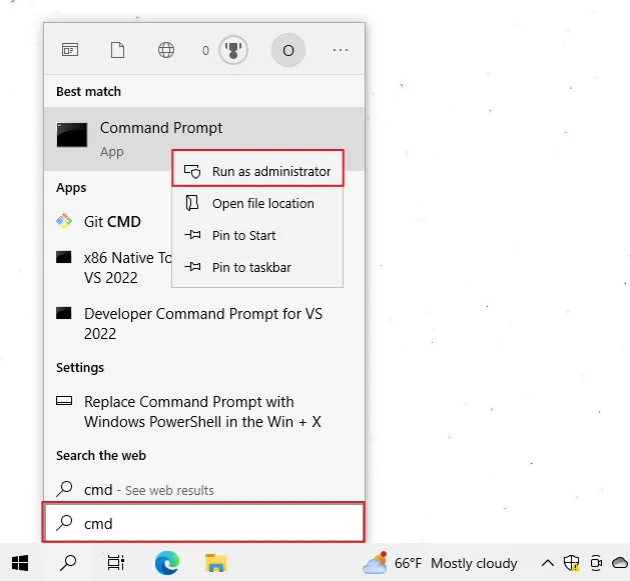
If you get the error
"'pip' is not recognized as an internal or external command",
use the python -m command when installing pipenv.
# 👇️ first uninstall `virtualenv` and `pipenv` python -m pip uninstall virtualenv pipenv -y py -m pip uninstall virtualenv pipenv -y python3 -m pip uninstall virtualenv pipenv -y # 👇️ now install `pipenv` python -m pip install pipenv py -m pip install pipenv python3 -m pip install pipenv
You can also try to upgrade the package with the --upgrade option.
python -m pip install pipenv --upgrade py -m pip install pipenv --upgrade python3 -m pip install pipenv --upgrade
If you see an error message that "ps1 cannot be loaded because running scripts is disabled on this system", run the following command, type "yes" when prompted and rerun the activation command.
Set-ExecutionPolicy RemoteSigned -Scope CurrentUser
pipenv module is installed by using the pip show pipenv command.pip show pipenv pip3 show pipenv python -m pip show pipenv py -m pip show pipenv python3 -m pip show pipenv
The pip show pipenv command will either state that the package is not
installed or show a bunch of information about the package, including the
location where the package is installed.
If the error persists, you have to add Python to your user's PATH environment variable.
# Add Python to your user's PATH environment variable
To add Python to your user's PATH environment variable:
- Click on the Search bar and type "environment variables".
- Click on "Edit the system environment variables".
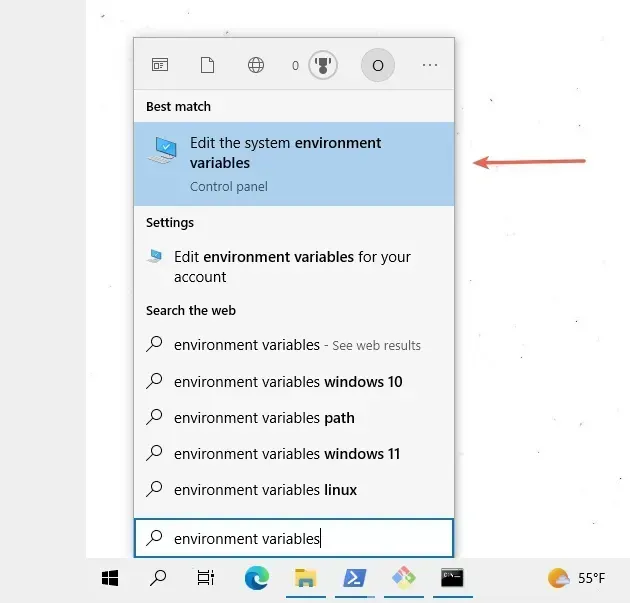
- Click on the "Environment Variables" button.
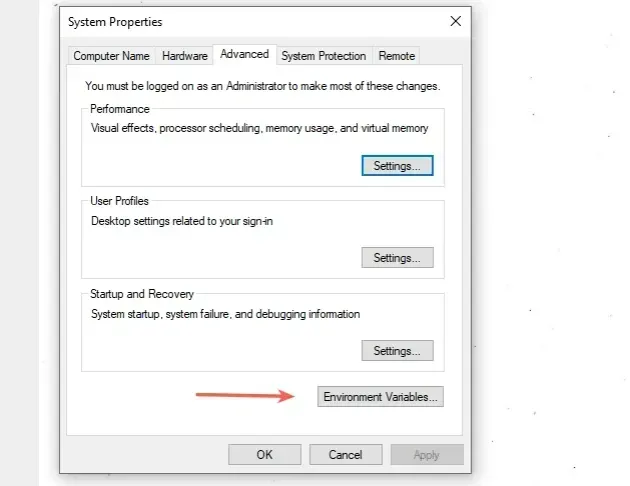
- In the "User variables for YOUR_USER" section, select the "Path" variable and click "Edit".
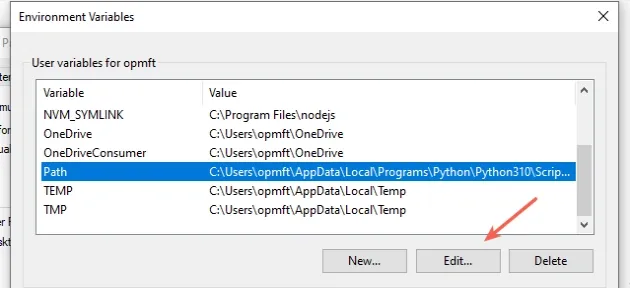
- Click on "New" and then click "Browse".
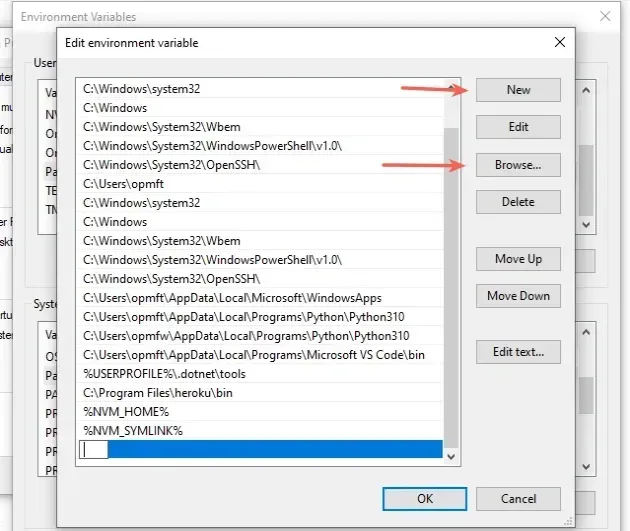
- You can use one of the following commands to check where your Python installation is located.
python -c "import os, sys; print(os.path.dirname(sys.executable))" where python

For me, the path is the following.
C:\Users\YOUR_USER\AppData\Local\Programs\Python\Python310
Note that I have Python 3.10 installed, which is reflected in the PATH.
- Add the path to Python and then add the path to the
Scriptsdirectory that is located in your Python3X folder. This is where the executable files are located.
For me, it is the following path.
C:\Users\YOUR_USER\AppData\Local\Programs\Python\Python310\Scripts

- Once the two paths are added, confirm the changes by clicking on the "OK" button twice.
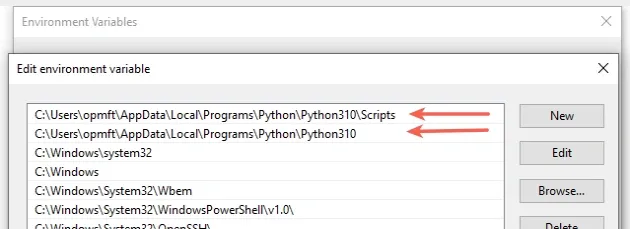
- Close your Command prompt application and then reopen it.
You might also have to restart your PC, but that's not always necessary.
If you still encounter issues, try to add Python to your PATH using the official installer.
Download the installer from the official python.org website.
If you have Python already installed, start the installer and click on "Modify".
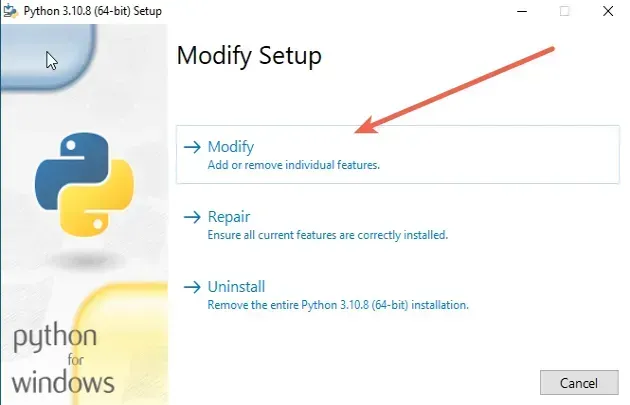
You can leave the optional features ticked.
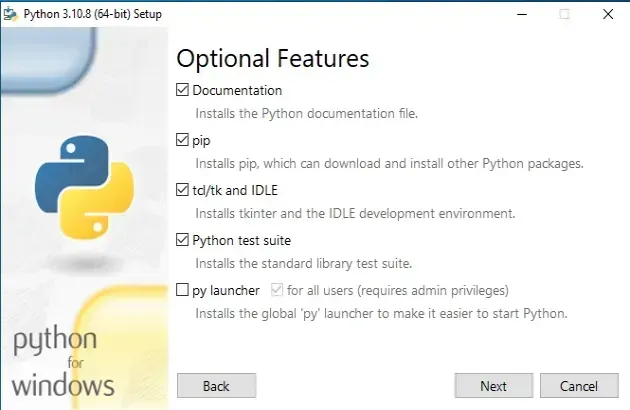
- On the "Advanced Options" screen, make sure to tick the "Add Python to environment variables" option.
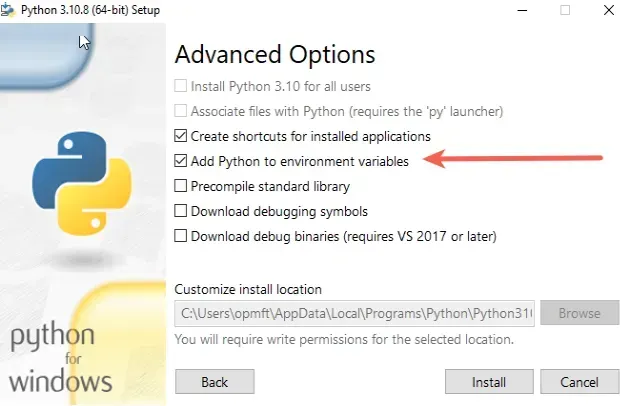
- Once the "Add Python to environment variables" checkbox is checked, click "Install".
If that didn't work, your Python installation might be corrupted.
Start the installer again and click on "Uninstall".
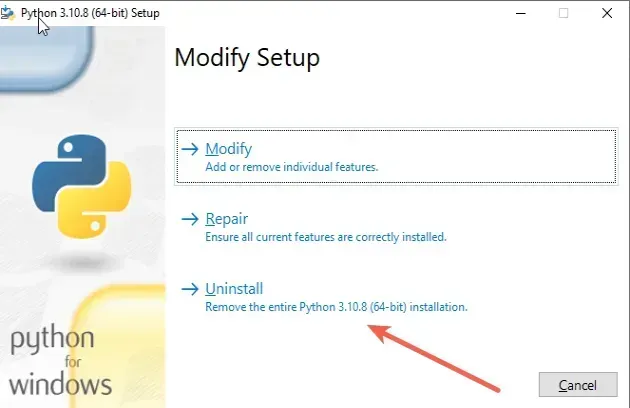
Now that you don't have Python installed on your machine, start the installer again and make sure to tick the "Add python.exe to PATH" option.
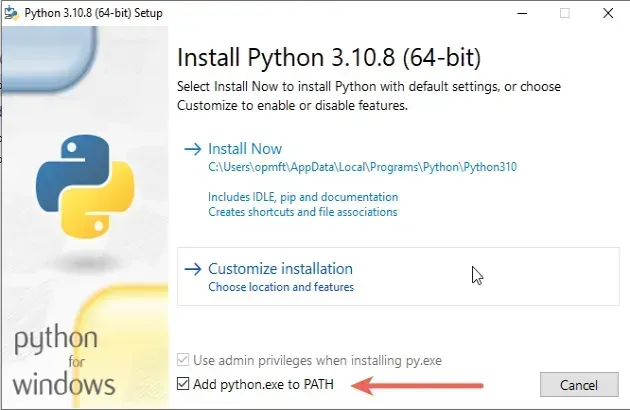
The checkbox won't be checked by default.
Once the "Add python.exe to PATH" checkbox is checked, click on "Install Now".
After the installation, Python will be installed and configured properly.
# Additional Resources
You can learn more about the related topics by checking out the following tutorials:
- source is not recognized as an internal or external command
- 'sudo' is not recognized as an internal or external command
- 'pyinstaller' is not recognized as an internal or external command
- 'django-admin' is not recognized as an internal or external command
- 'conda' is not recognized as an internal or external command
- jupyter is not recognized as an internal or external command

